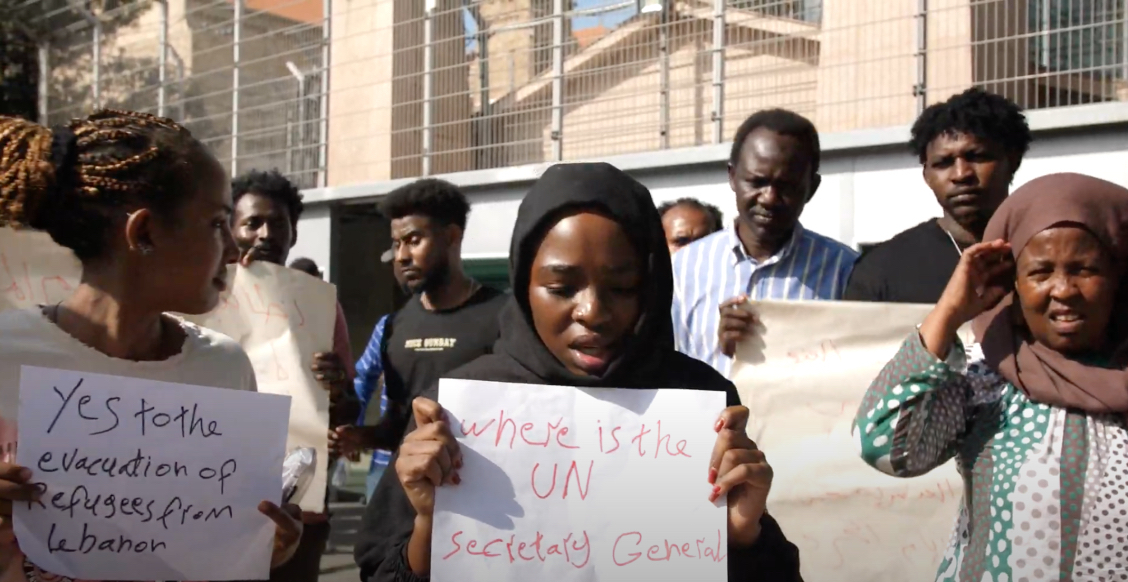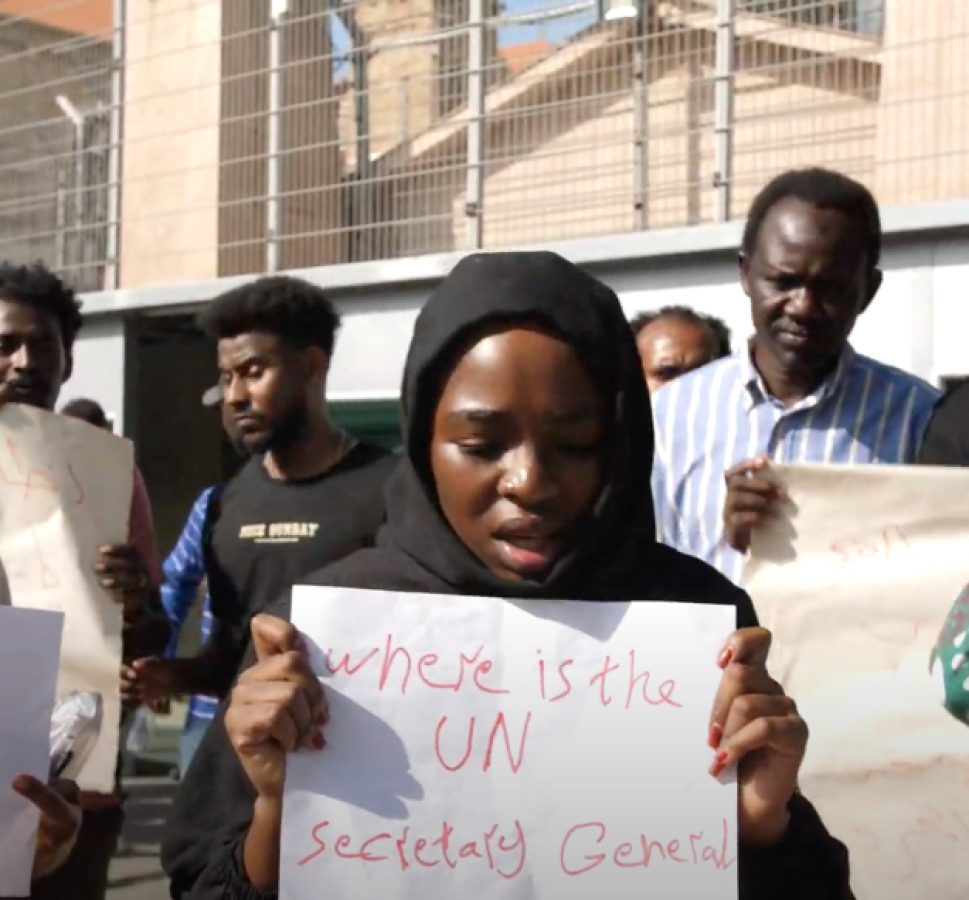
On November 10, Sudanese asylum seekers gathered to listen to Abdel Baqi Othman in a cafe in Lebanon’s capital Beirut.
The well-respected Sudanese activist spoke passionately about how Sudanese asylum seekers were trapped between the civil war in their homeland and Israel’s invasion of Lebanon.
He implored the UN refugee agency (UNHCR) to relocate registered Sudanese asylum seekers and refugees to Italy, Turkey or Cyprus until their asylum applications could be processed, or until they could be permanently resettled elsewhere.
In the crowd was Abdelmoniem Yahiya Othman, who held a sign that read, “No racism, no social violence. Stop killing civilians and children,” a plea against the myriad spectres threatening people in the region.
“We know the UN can distribute refugees and asylum seekers to different [safe] countries, but they are not doing anything,” he told Al Jazeera.
“We want to go to a place where the people are not at war.”

Between two wars
The war in Sudan between the army and the paramilitary Rapid Support Forces (RSF) erupted in April 2023.
The conflict has since killed tens – maybe hundreds – of thousands of people and generated the largest humanitarian crisis in the world.
UNHCR said 400 Sudanese nationals have applied for asylum in Lebanon since the war in Sudan began. Yahiya, a 38-year-old man with stubble around his chin and dark shadows under his eyes, is one of them.
As a “non-Arab” (the name used for the sedentary tribes) from Sudan’s Darfur, he fears he could be persecuted from both sides in the war based on his ethnicity.
The RSF – a group largely made up of “Arab” (nomadic) tribes from Darfur and elsewhere – has targeted non-Arab communities, leading to credible accusations of ethnic cleansing and genocide.
The army, meanwhile, has arrested, tortured and even killed civilians from Darfur out of suspicion they’re spying for the RSF, according to a report by local and international rights groups and a team of researchers from the School of Oriental and Asian Studies.

Given the danger in Sudan, Yahya felt safer in Lebanon until Israel escalated its war against the country in late September.
Yahiya and his wife Nokada were working on a farm in the southern governorate of Nabatieh when Israel began carpet-bombing Lebanon. His employer fled, ordering the couple to stay and protect the farm.
Without a car to escape in or a shelter to run to, Yahiya and Nokada endured several terrifying days as bombs lit up the night sky and they struggled to sleep.
“At night, I would see Israel fire missiles and drop cluster bombs from the air… so scary. I remember watching them break off into little fragments and fall all around us,” Yahya said.
Ten days later, he and his wife decided to head to Beirut on foot. They walked for days, stopping at villages along the way, where they stayed with friends and peers to rest.
They trekked at least 30km (19 miles), passing a long line of cars stuck in traffic, sometimes having to climb over piles of rubble from damaged homes.
“I remember seeing people get out of cars [because traffic wouldn’t move] and just begin walking, as well,” he told Al Jazeera.

When they finally reached Sidon, a city about 44km (27 miles) from the capital, they hitched a ride with Syrian and Sudanese people heading to Beirut.
In Beirut, Yahya and Nokada went to the only place that would accept them: The Sudanese Cultural Club in the bustling neighbourhood of Hamra.
The Sudanese Cultural Club
Tucked away on a side street, the Sudanese Cultural Club was established in 1967 as a social place for a community that has long suffered from racial discrimination in the country.
The club is tucked away behind a wall of green trees and bushes. The roomy interior has two large living rooms, two toilets and a basic kitchen.
A large Sudanese flag hangs on the wall, facing several well-used comfy sofas and wooden tables.
For years, the Sudanese community gathered there to celebrate holidays, attend cultural events, socialise and eat meals together. In the back room, Sudanese men would play cards, smoke and drink tea all night.
Since Israel’s invasion, the club has sheltered displaced Sudanese nationals, along with other migrant workers in the country.
Yahiya says more than 100 people had taken refuge in the club in October. While many moved on, Yahiya and Nokada are still there, along with several other families.

Sometimes being there is not comfortable, he said, due to tensions over the lack of space and toilets but the displaced people cooperate to cook, clean and take care of each other.
Yahyia is thankful to have a refuge but knows that the club is only a temporary solution.
This is why he supports the community’s call to be evacuated to a safe third country while their asylum claims are processed.
Protection gap
Most asylum seekers escape the threat of persecution or war to seek refuge in a nearby country.
There, they register at the nearest UNHCR office, often waiting years until the agency decides whether to confer refugee status.
Only some asylum seekers are recognised as refugees and even fewer get resettled to a third country to begin a new life.
This means most will spend their lives in the country they initially claimed asylum in, grappling with poverty, a lack of opportunities and, often, abuse from local authorities.
Despite their ordeal, though, refugees and asylum seekers generally remain relatively safe from the threats in their homeland – but those in Lebanon do not feel safe as Israel’s assault continues.

According to the International Organisation for Migration (IOM), there are about 11,500 Sudanese nationals in Lebanon. Of this number, 2,727 are registered as refugees and asylum seekers, according to UNHCR.
Many, about 541, are counting on Othman and other community leaders calling for an evacuation.
“[T]he UNHCR says that it doesn’t evacuate. That’s not true and they’re lying to us. It’s a scandal,” Othman told Al Jazeera.
He referenced the evacuations UNHCR oversaw from Libya, where more than 2,400 asylum seekers and refugees were relocated to Rwanda on 19 evacuation flights between 2019 and 2024.
Those evacuations were made possible thanks to a memorandum of understanding signed between UNHCR, the African Union and Rwanda, according to UNHCR.
Hundreds more were temporarily relocated to Italy via a humanitarian corridor established by community-based groups, who fully sponsored the asylum seekers, in cooperation with the UNHCR, whose role was identifying vulnerable asylum seekers and refugees and facilitating their travel.
Since 2017, a total of 12,000 asylum seekers and refugees have been evacuated from Libya due to the abuse and exploitation they face from fighter groups and traffickers, according to UNHCR, rights groups and experts.

But the agency may be reluctant to advocate for more evacuations, according to Jeff Crisp, an expert on asylum and migration at the University of Oxford and former head of policy and development at UNHCR.
“My guess is that UNHCR is very wary of setting up additional evacuations because it will set up a domino effect whereby refugees across the world will begin requesting [temporary] evacuations,” Crisp said.
He believes the lack of a permanent framework to help asylum seekers trapped in a war is a gap in international refugee protection, given that host countries are not always safe.
“[N]ow you have situations – like in Libya or Lebanon – where refugees and asylum seekers are caught up in very vicious conflicts,” he added.
Dalal Harb, UNHCR spokesperson in Lebanon, told Al Jazeera the evacuations from Libya were “responses to a specific crisis and were not intended as permanent frameworks”.
“The feasibility of replicating such operations depends on various factors, including the willingness of third countries to host evacuees, available resources and the specific circumstances of the crisis,” she said in an email.
Yahya is unconvinced.
“We need UNHCR to evacuate us,” he said. “We know the agency has the power to redistribute asylum seekers and refugees to other countries.”
Harb said UNHCR is urging Western governments to quickly relocate recognised refugees awaiting resettlement from Lebanon.
“This includes Sudanese as well as refugees of other nationalities,” her email read.
Last Resort
According to Othman, many asylum seekers and refugees will likely resort to smugglers if they can afford them.
Smugglers often put vulnerable people on overcrowded dinghies and push them in the direction of Europe – many have arrived in Cyprus from Lebanon in recent years, but others have drowned.
Despite the risks, Othman warned, more and more Sudanese asylum seekers will look for any route out of Lebanon if the situation deteriorates.
However, Yahya says most asylum seekers do not have the money to escape. Those who do, he claims, pay anywhere between $2,000 and $3,000 to reach Turkey via Syria.
For now, Yahya said Sudanese asylum seekers are praying God takes care of them while they remain in Lebanon.
“We worry that the situation here could get worse,” he said. “But we don’t have money…we have no choice but to rely on the UNHCR.”






